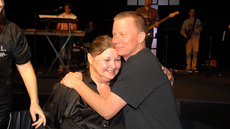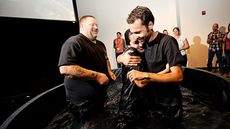Faith and works are like oil and water: they just don’t go together. At least, that’s what some of us have heard. Same goes for love and labor. We tend to associate love with spontaneous feelings and labor with dry duty. We first separate these ideas from one another, and then we elevate the importance of one over the other (though our preferences may vary). Finally, we either forget about the “unimportant” one, or we make it out to be a sort of enemy, as if duty could spoil love or love could cheapen duty.
But that’s not the way the Apostle Paul thought when he wrote to the Thessalonians. He said these words in 1 Thessalonians 1:2–3 (emphasis mine):
We give thanks to God always for all of you, constantly mentioning you in our prayers, remembering before our God and Father your work of faith and labor of love and steadfastness of hope in our Lord Jesus Christ.
The work of faith, labor of love, and steadfastness of hope are the fruits of the Thessalonian Christians’ changed lives. For them, faith, hope, and love were not just feelings in the heart—they were expressed in concrete, specific, visible ways that even got them into trouble at times.
Their faith worked, no doubt including things like serving orphans and widows, helping the poor, or showing hospitality to strangers. Their love labored; this would have involved strenuous self-sacrifice for the sake of other Christian brothers and sisters. Their hope remained steadfast even under the burdens of trial and temptation.
Nor were faith, hope, and love merely vague, spiritual sentiments. They were all about Jesus: faith that God had kept his promises in Jesus, love for others that flows from Christ’s greater love and points back to it, and hope that endures by looking forward to Christ’s return and the final resurrection.
Their Christian testimony was legendary, making an impact on the world around them and encouraging Christians by their example in other cities near and far (1 Thess. 1:7–8). In fact, we’re still talking about it today.
But here’s the thing about a good example. While at first it may inspire us, eventually it may expose our weakness. Inspiration may give way to disappointment when we fail and eventually perhaps even to jealousy or cynicism.
The Thessalonians didn’t set a good example merely by their willpower, though. They were loved and chosen by God, and empowered by the Holy Spirit. In short, God’s grace moved them, and the same gracious Spirit works in us today.
It’s good to have a good example. It’s even better to be graced by God in such a way that we are assured of his love, even when we fall short of the example. What’s more, this same grace changes us through and through, empowering the Christian faith, hope, and love that changes the world.
Mike Wilkerson is the director of biblical counseling for Mars Hill and a pastor at the Ballard church.















